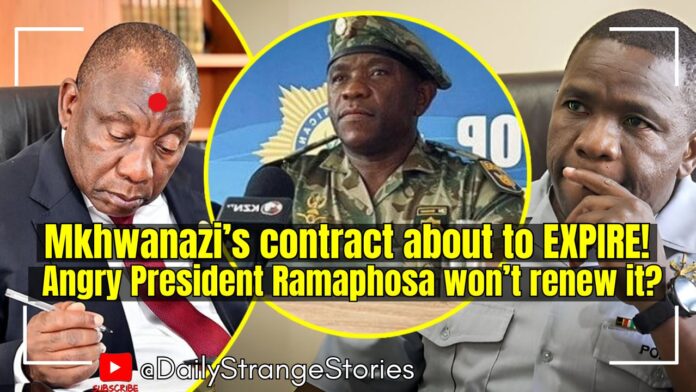An ongoing battle against hidden wrongdoing in South African police force, a high-ranking officer, Lieutenant General Nhlanhla Mkhwanazi, has stepped forward with claims that could reshape the nation's approach to law enforcement. As the KwaZulu-Natal Police Commissioner, Mkhwanazi chose to reveal what he described as deep-rooted corruption, political meddling, and improper actions within the South African Police Service.
This bold move, made public during a press briefing on 6 July 2025, has placed him in a precarious position. With his contract set to expire in December 2025, questions now swirl about whether his decision to expose these issues will lead to his removal from the role. Many observers fear that those in power might choose not to renew his term, seeing it as a way to silence a voice that has dared to challenge the status quo. This story unfolds against a backdrop of tangled alliances, mysterious deaths, and a system struggling to clean itself from within, raising concerns that Mkhwanazi's revelations might come at the ultimate professional cost.
The events leading to this moment began to build over several years, with Mkhwanazi positioning himself as a key figure in addressing serious crimes in KwaZulu-Natal. His tenure has been marked by efforts to tackle organized networks that have long plagued the province, but it was his recent accusations that truly brought matters to a head. During that briefing, Mkhwanazi pointed fingers at Police Minister Senzo Mchunu and Deputy National Commissioner Lieutenant General Shadrack Sibiya, claiming they had interfered in critical investigations. Specifically, he alleged that Mchunu had single-handedly shut down a special unit known as the Political Killings Task Team in December 2024, a group formed in 2018 to look into assassinations tied to political motives. This shutdown, according to Mkhwanazi, halted progress on numerous cases, including 121 active files that were then moved to Sibiya's office in Pretoria, where they reportedly stalled without further action.
These files, Mkhwanazi explained, involved sensitive matters with potential links to influential figures. He presented evidence in the form of screenshots from WhatsApp messages between a businessperson from the North West named Brown Mogotsi and another individual called Vusimuzi Matlala, who was already in custody for unrelated charges. The messages suggested that these individuals had prior knowledge of the task team's closure and details about confidential case documents, hinting at leaks from within the police intelligence unit. Mogotsi, known for his connections to senior members of the African National Congress, including possibly Mchunu himself, appeared to benefit from this inside information.
Mkhwanazi went further, suggesting that a faction within the Crime Intelligence branch had aligned itself with political and criminal interests, compromising sources and derailing efforts to bring suspects to justice. This internal capture, he argued, was not the work of outside forces but stemmed from betrayals within the system itself.
The fallout from these claims was swift. President Cyril Ramaphosa responded by placing both Mchunu and Sibiya on leave, announcing an inquiry to examine the allegations. On 10 July 2025, Ramaphosa held separate meetings with Mchunu and Mkhwanazi in Pretoria, pressing the minister for explanations and demanding proof from the general. A week later, another discussion took place involving Ramaphosa, Mchunu, National Police Commissioner General Fannie Masemola, and Mkhwanazi together. Sources close to these talks indicated that Ramaphosa expressed frustration over the timing of Mkhwanazi's public statements, which came while the president was attending the BRICS summit in Brazil. This perceived slight has fueled speculation that Ramaphosa's irritation could influence decisions about Mkhwanazi's future, particularly regarding the renewal of his contract.
Adding to the tension, the State Security Agency issued a strong advisory to Ramaphosa, cautioning against any moves to sideline Mkhwanazi. They warned that such actions could spark widespread unrest across the country, given the general's popularity and the public's growing distrust of corruption in government. This advice underscores the high stakes involved, as Mkhwanazi has become a symbol of resistance against systemic failures. His contract, due to end on 31 December 2025, requires a formal renewal process, typically initiated by the employer several months in advance. Masemola, when asked about the possibility, noted that it would depend on discussions between the employee and the organization, praising Mkhwanazi as a capable young leader performing well in his duties. However, without an official approach yet, uncertainty lingers.
Support for Mkhwanazi has poured in from various quarters, highlighting his value to the force. Julius Malema, leader of the Economic Freedom Fighters, publicly backed the formation of a parliamentary Ad Hoc Committee on 23 October 2025 to investigate the claims. This 11-member group, approved unanimously by Parliament, is tasked with probing the allegations and reporting back by the end of October 2025. Malema, who plans to serve on the committee himself, emphasized the need for evidence to back up Mkhwanazi's statements, calling it a crucial step to uncover what he sees as criminal activities within the police. He argued that the 90-day timeline might prove too short, suggesting extensions could be sought if needed, and stressed that members should be ready to work tirelessly, even on weekends, to address this emergency.
Malema went on to describe Mkhwanazi as a hero who bypassed normal channels to reveal the truth, urging the nation to protect him from any form of retaliation. He proposed that Mkhwanazi's role in KwaZulu-Natal has outgrown the province, suggesting a promotion to a national position, perhaps even to handle crime issues in the Western Cape, where he believes similar networks thrive under political protection. Malema also criticized past commissions of inquiry as tools used by leaders to delay resolutions, referencing examples where time allowed public attention to fade. He called for Mchunu's dismissal, insisting that police should be free to pursue any leads without interference.
Public demonstrations have echoed these sentiments, with people gathering to demand the renewal of Mkhwanazi's contract. One supporter, Sinothile Ngcobo, highlighted the sense of security and progress felt under his leadership, expressing hope that he would continue in the role. These marches reflect a broader appreciation for the changes Mkhwanazi has brought, such as increased visibility in combating crime and a perceived reduction in unchecked activities in KwaZulu-Natal.
From a legal standpoint, experts like Democratic Alliance spokesperson Michael Bagraim, a labor lawyer, have weighed in on the contract renewal process. Bagraim explained that such agreements are often extended if the employee's performance has been positive, operational needs support it, and there are no disciplinary issues. In Mkhwanazi's case, his long service without warnings or noted deficiencies points toward a likely renewal. However, he acknowledged that the press briefing might have upset some senior officers, who view it as a breach of protocols. Bagraim suggested that if this leads to prejudice against Mkhwanazi, he could challenge it through formal channels, potentially framing his disclosures as protected under whistleblower laws. This perspective adds another layer to the debate, indicating that any decision not to renew could face legal scrutiny.
To fully grasp the weight of Mkhwanazi's actions, one must look back at the web of events that his revelations have illuminated. Over the past four years, a pattern of assassinations and disruptions has revealed connections between organized crime, political figures, and elements within the police. It started with cases like the killing of Babita Deokaran on 23 August 2021, a health department official who had flagged irregular payments totaling 850 million rand at Tembisa Hospital. Her death came after she exposed companies linked to suspicious tenders, some of which traced back to Matlala. Although hitmen were later convicted, the individuals behind the planning remain at large, suggesting a cover-up that protected higher-ups.
This thread continued with the shooting of actress Tebogo Thobejane on an unspecified date in October 2023, near Grayston Drive in Sandton. Thobejane, who survived with a foot injury while her passenger suffered more serious harm, had connections to Matlala, her former partner. Matlala's arrest on 14 May 2025, along with three others, on charges including attempted murder and money laundering, tied directly to this incident. A fifth suspect was apprehended shortly after, strengthening the case. Matlala's involvement extended to procurement scandals, including a 360 million rand police health services contract that was later canceled amid investigations.
The pattern grew more intricate with the assassination of engineer Armand Swart in April 2024 outside his workplace in Vereeniging. Ballistic evidence later linked the firearm used in this killing to another high-profile case: the murder of musician Oupa John Sefoka, known as DJ Sumbody, along with his two bodyguards in November 2022. On 21 July 2025, four suspects, including businessperson Katiso Molefe, were arrested in connection with Sefoka's death. Molefe, already out on bail for Swart's murder, was connected through ballistics, phone records, and witness accounts. Two of the alleged perpetrators also faced links to the Thobejane attempt, weaving these incidents into a single narrative of targeted hits.
Mkhwanazi's briefing highlighted how these cases were disrupted. He accused Sibiya of seizing dockets from KwaZulu-Natal in March 2025, including five with pending arrest warrants, and relocating them to Pretoria, effectively halting progress. This move, he claimed, protected politically connected suspects. Additionally, irregularities in Crime Intelligence came to light with the arrest of its chief, Lieutenant General Dumisani Khumalo, and six senior officers on 26 June 2025, on charges of fraud and improper promotions. One example involved elevating Dineo Mokwele, daughter of a Hawks brigadier, to a high rank despite her lack of policing experience. These arrests were seen by some as part of a cleanup effort, but others viewed them as factional retaliation.
Further probes revealed misuse of state funds in Crime Intelligence, where officers allegedly bought private properties under the pretense of operational needs, leading to arrests of procurement staff. Defenses from the accused pointed to internal politics as the motive, but the overall picture suggested a branch compromised by self-interest. The disbanding of the Political Killings Task Team exacerbated this, as it had been compiling evidence of an organized network behind these deaths, evidence that Mkhwanazi said was deliberately scattered to prevent arrests.
Parliament has responded by directing multiple committees, including those on Police, Justice and Constitutional Development, and the Joint Standing Committee on Intelligence, to review Mkhwanazi's claims urgently. The Ad Hoc Committee represents a focused effort, with Malema hoping to chair it to ensure thoroughness. He criticized funding cuts to law enforcement under the Government of National Unity, arguing that Mkhwanazi's exposures prove such decisions harm the fight against crime.
As these investigations proceed, the nation watches closely. Mkhwanazi's future hangs in the balance, with his contract renewal potentially hinging on how his superiors view his whistleblowing. Supporters argue he deserves retention and elevation, while critics within the ranks see his methods as disruptive. The saga connects to broader issues, like the Zondo Commission's lengthy process that some say allowed key figures to escape scrutiny. In KwaZulu-Natal, where Mkhwanazi has made strides, residents feel a tangible difference, from reduced fear in communities to more effective policing against entrenched groups.
This intricate tale of exposure and potential consequence reveals a system at war with itself, where one man's stand could either spark reform or lead to his quiet exit. As South Africa grapples with these revelations, the question remains whether leaders will prioritize truth over convenience. What do you think—should General Mkhwanazi's contract be renewed to continue his fight against corruption, or does his approach risk too much disruption to the police force? Share your thoughts in the comments below, and let's discuss how this could shape the future of law enforcement in our country.

Follow Us on Twitter











